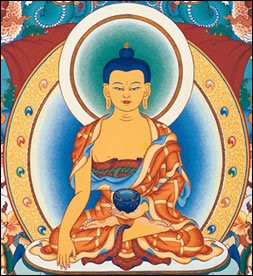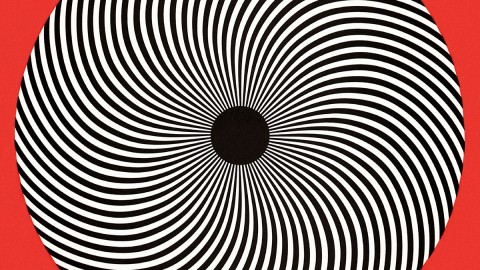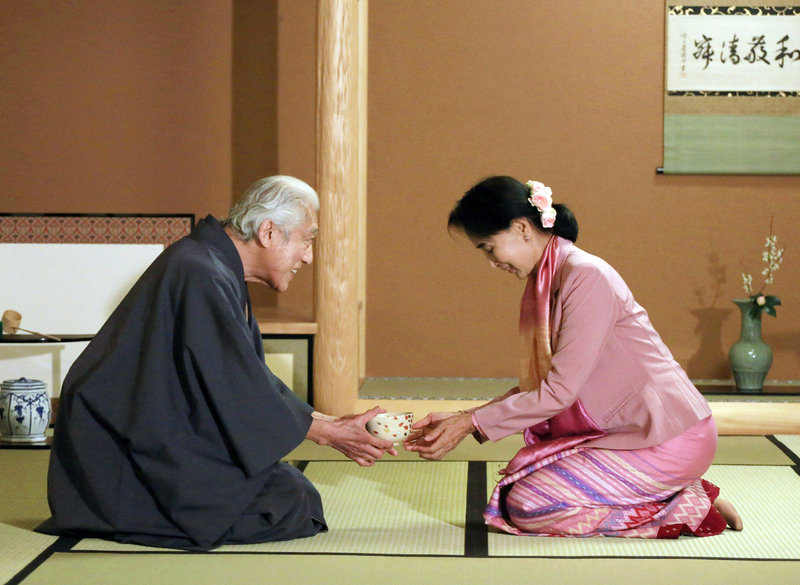Nonviolence, non-possessiveness, no-theft, and authenticity in being gives purity.
These are not moralistic concepts for Patanjali; this has to be always kept in mind. In the West they have been taught as morals; in the East as inner hygiene, not as morals. In the West they have been taught as altruistic goals; in the East there is nothing of altruism in them – it is absolutely selfish. It is your inner hygiene. They give purity to you, and through purity the impossible becomes possible, the unattainable is attained. Through purity your grossness of being is lost. You become delicate, subtle, and soft. Through purity you become a temple of the divine. Through purity an invitation is sent to the whole to come, and drop in you… and the ocean comes one day, and drops into the drop.
When they are taught as moralistic concepts, as in the West – or in India also, as Mahatma Gandhi has been teaching – their total quality changes. When you say, “You have to be nonviolent because violence hurts others. Don’t hurt anybody. Humanity is one family, and to hurt is to sin,” you have diverted the whole thing to a totally different dimension. Patanjali says, “Be nonviolent: it purifies you. Don’t hurt anybody – don’t even think of hurting anybody, because the moment you start thinking that way you are falling into impurity inside.” The question is not the other, the question is you. Of course, when one is nonviolent others are benefited, but that is not the goal of being nonviolent. That is just a by product, just a shadow.
If you are nonviolent because others should not be hurt, then you are not really nonviolent. Then, you are a good social citizen, civilized, but nothing of religion has happened within your being. Your nonviolence will work as a lubricant between you and others. Your life will be smoother, but not purer, because the goal changes the whole quality. The goal is not to protect the other – the other is protected, that’s another thing – the goal is to become pure so that you can know the ultimate purity.
Eastern religions remain selfish because they know there is no other way to be; and when somebody is selfish others are benefited immensely. In fact all altruism, real authentic altruism, flowers out of deep selfishness. They are not contraries, they are not opposites: the flowers of altruism bloom only in a being who has been deeply selfish. To be selfish is just natural. To force people to be otherwise is to make them unnatural, and whatsoever is unnatural is not the way of God. Whatsoever is unnatural is going to be a suppression; it will not bring purity to you.
So this has to be remembered: these are not moralistic goals. In fact in the East morality has never been taught as a goal; it is a shadow of religion. When religion happens, morality happens automatically – one need not bother about it.
One need not be concerned; it comes on its own accord. In the West morality has been taught as the goal – in fact, as the religion. There exists nothing in the Eastern scriptures like the Ten Commandments, nothing like it.
A life should not be a life following commandments, otherwise you will become a slave. And even if you reach paradise through slavery, your paradise is not going to be enough of a paradise – slavery will remain a part of it.
Independence, freedom, should be an intrinsic part of your growth.
So these are hygienic measures. They purify you; they give you inner health.
WHEN PURITY IS ATTAINED, SAYS PATANJALI, THERE ARISES IN THE YOGI A DISGUST FOR HIS OWN BODY AND A DISINCLINATION TO COME IN PHYSICAL CONTACT WITH OTHERS.
There is some difficulty with the word jugupsa. It has been translated in all the translations as “disgust” because no equivalent word exists in English. It is not disgust, not at all; the very word is wrong. The very word “disgust” is disgusting.
And to think of a yogi, that disgust arises in him for his own body, is simply unbelievable because yogis have cared for their bodies as nobody else has ever cared. They look after their bodies as nobody looks after their bodies; they have beautiful bodies. Look at Mahavir or Buddha – beautiful bodies, very proportionate, like symphonies in matter. No, it is not possible. “Disgust” is a wrong word; first, it has to be understood.
Jugupsa does not mean disgust. The meaning is very difficult; I will have to explain to you. There are three types of people. One, who are madly in love with their bodies; in fact obsessed. Particularly women – absolutely body-oriented.
Look at a woman: she is never happier than when she is facing a mirror.
Narcissistic – hours and hours they can devote before the mirror… obsessed.
Nothing is wrong in being in front of a mirror, but just being there, for hours, looks like an obsession. This is the first type, who is continuously obsessed with the body – so much so that he forgets that he exists beyond the body. The transcendental is forgotten; he becomes only the body. He does not possess the body; the body possesses him. This is the first type of man.
The second type of man is just the opposite of the first: he is also obsessed – in the reverse direction. He is against the body, disgusted with it: he has broken the mirror. He goes on hurting his own body in millions of ways; he hates it. The first loves it as an obsession; the other moves to the other extreme – he hates it.
He wants to commit suicide.
You can find the second type; they may be pretending to be yogis, but they are not. The yogi cannot hate. It is not a question of any object: the yogi simply cannot hate because hate creates impurity. It is not a question of hating somebody else or something or one’s own body: whatsoever the object of hate, hate brings impurity. The yogi cannot hate his own body. But you can find this type of perverted yogi in the streets of Benares Lying on thorns or pointed steel nails, torturing his own body. This is just the opposite of a woman enjoying a narcissistic indulgence before a mirror.
Fasting: fasting in itself can be good, can be bad. It depends. Fasting can be just a way of torturing the body; then it is bad, then it is violence. And this is my observation: people who are not violent towards others, who have suppressed their violence towards others and have become nonviolent – their violence starts a new way: as a release they start becoming violent towards their own bodies.
There are stories of perverted people who destroyed their own eyes so that they could not see a beautiful woman. Stories of people – and not exceptional, in thousands.
In Russia there existed a sect before the revolution, thousands of followers, who had cut off their genital organs – just to be in deep hate with the body. They could not produce children. But then how to increase the number of the followers – because every organization is interested? So they were in difficulty.
They would adopt children and cut off their genital organs – a criminal act against one’s own body.
In Christianity there have been sects whose only prayer was to flog their own body every morning. And the greatest saint was thought to be one who flogged his body so much that it became blue – all over the body, skin broken and blood flowing. It used to be written in the biographies of great saints how many times he hits his body in the morning with a whip – one hundred times, two hundred times, three hundred times; just as in India Jain monks go on counting their days, how many days they have fasted in the year – one hundred days, fifty days, how many days. The greater one is who has been fasting, almost starving, his own body.
In Christianity there have been monks who had nails in their shoes intruding in their bodies; and they would walk on those shoes and they would carry continuous wounds in their feet. Blood flowing, puss accumulating – they were great saints.
If one looks at religion scientifically then ninety per cent of it will prove to be pathological. These people needed mental treatment. These people were not religious, not at all. To call them religious is simply foolish: they were not even normal; they were mad.
These are the two types, and then between these two – just exactly in the middle – is the third, for whom Patanjali uses the word jugupsa: he is not disgusted with his own body, he is not obsessed either. He is in a deep balance. He takes care of the body because the body is a vehicle. He even treats the body as a holy thing. It is – God created it; and whatsoever God creates, how can it be unholy? It is a temple. It has not to be condemned. It has not to be indulged so madly that you are lost in it.
The temple should not become the image; the temple should not become the shrine. The shrine is the innermost core for which the temple exists. You should not start worshipping the walls of the temple, but there is no need to move to the opposite – that you start destroying the temple.
Just a deep non identification is needed. One has to know: “I am in the body, but transcendental to the body. I am in the body, but not the body. I am in the body, but not confined to it. I am in the body, but also beyond it.” The body should not be a limitation – a shelter, of course, and a beautiful shelter at that. One has to be grateful to it; there is no need to fight with it. It is simply foolish and childish to fight with it. It has to be used – and used rightly.
Jugupsa says… if I have to translate it somehow then I will say: the yogi is disillusioned with the body. Not disgusted – simply disillusioned. He does not think that through the body the bliss that the soul is seeking is possible, no. But he does not think the contrary also: that through destroying the body that bliss can be attained. No, he drops the duality. He lives in the body as a guest, and he treats the body as a temple.
Tags: Patanjali Yoga Sutra 27 Disillusioned With The Body










